The new Start menu finally has a toggle to hide the Recommended section. This means you can now only have your pinned apps and installed apps in the Start menu, but I noticed that there’s a trade-off. It also turns off the ‘Recent files’ section in File Explorer and the jump list (menu that shows up when you right-click on the taskbar).
The new Start menu is rolling out with Windows 11 KB5067036 (Build 26200.7019 / 26100.7019) or newer, but Microsoft says the rollout is very slow. If you don’t see the new Start menu, you can force-enable it using an open-source tool. Or you can wait until November 11 when Microsoft releases Patch Tuesday updates.
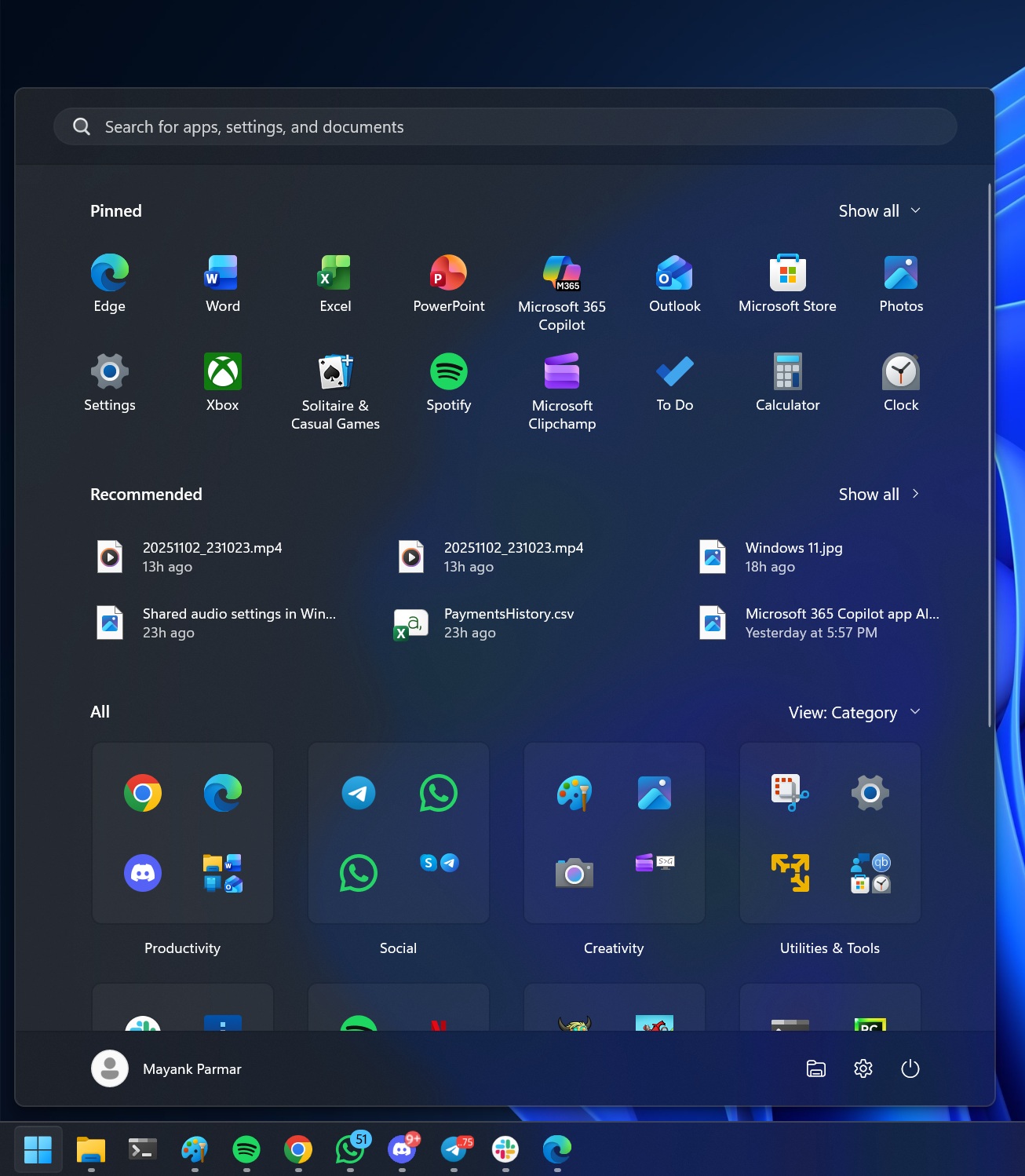
The Start menu has a new setting called “Show recommended files in Start, recent files in File Explorer, and items in Jump Lists“, and it’s available under Personalization > Start.
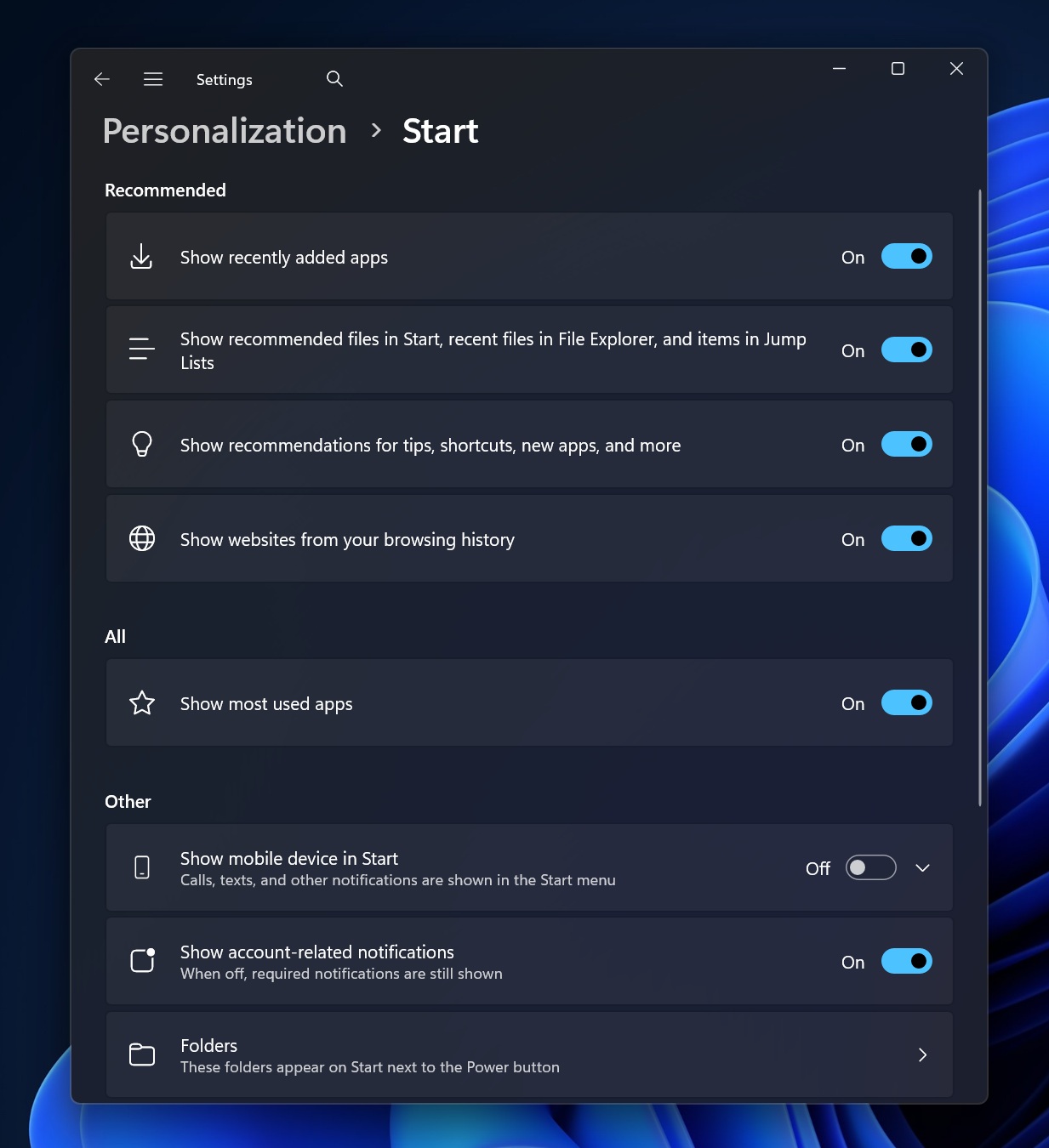
But this new toggle is a perfect example of bad UX. There’s no way to turn off file recommendations in Start only, which is what we want.
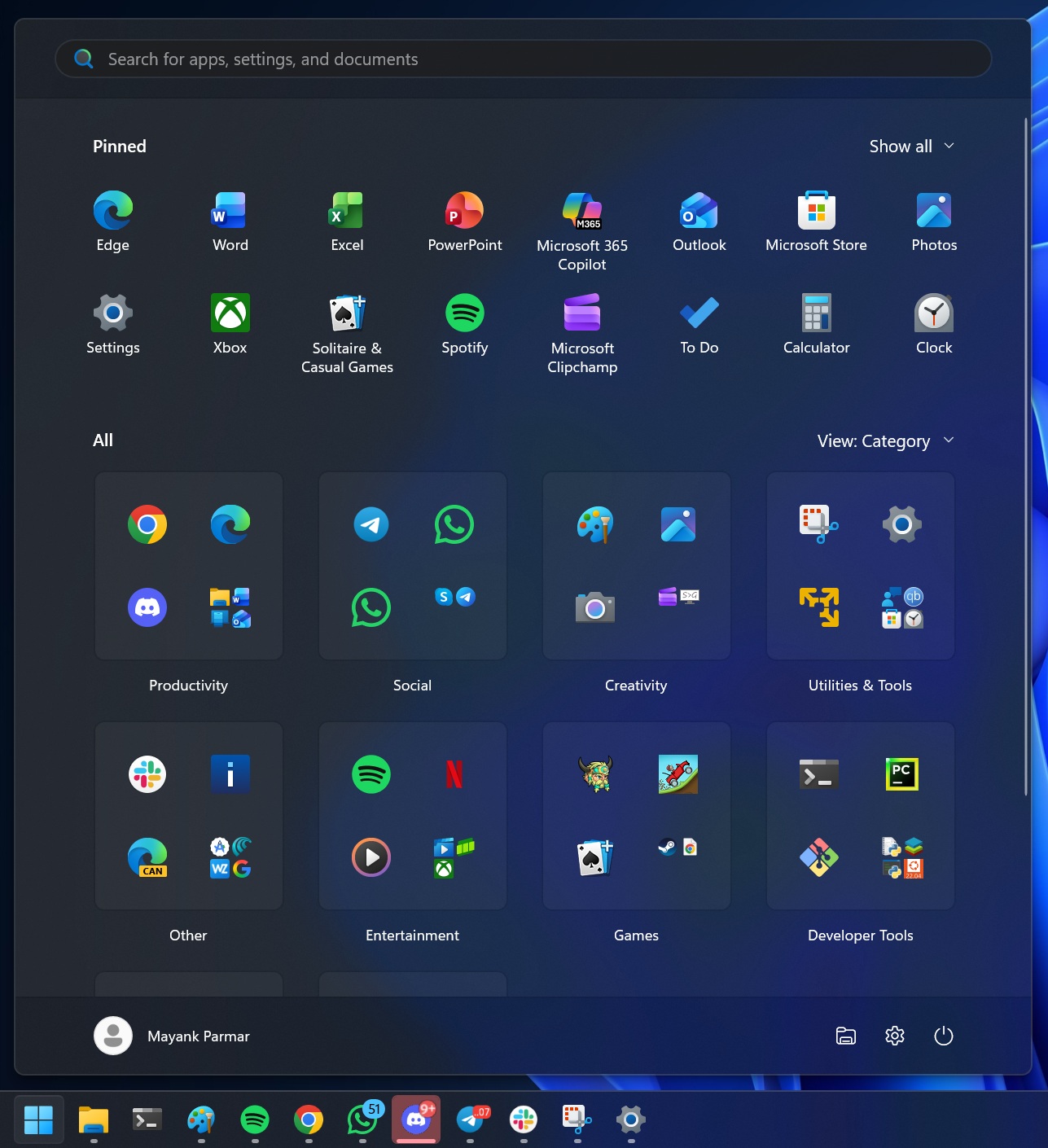
In our tests, Windows Latest observed that the Recommended feed in the Start menu, Recent files in File Explorer, and the taskbar jump list are linked to the same recent activity engine. Windows maintains a single list where it stores your recent files, apps, or sites. The Start menu, File Explorer, and taskbar jump list all refer to that list to pull data.
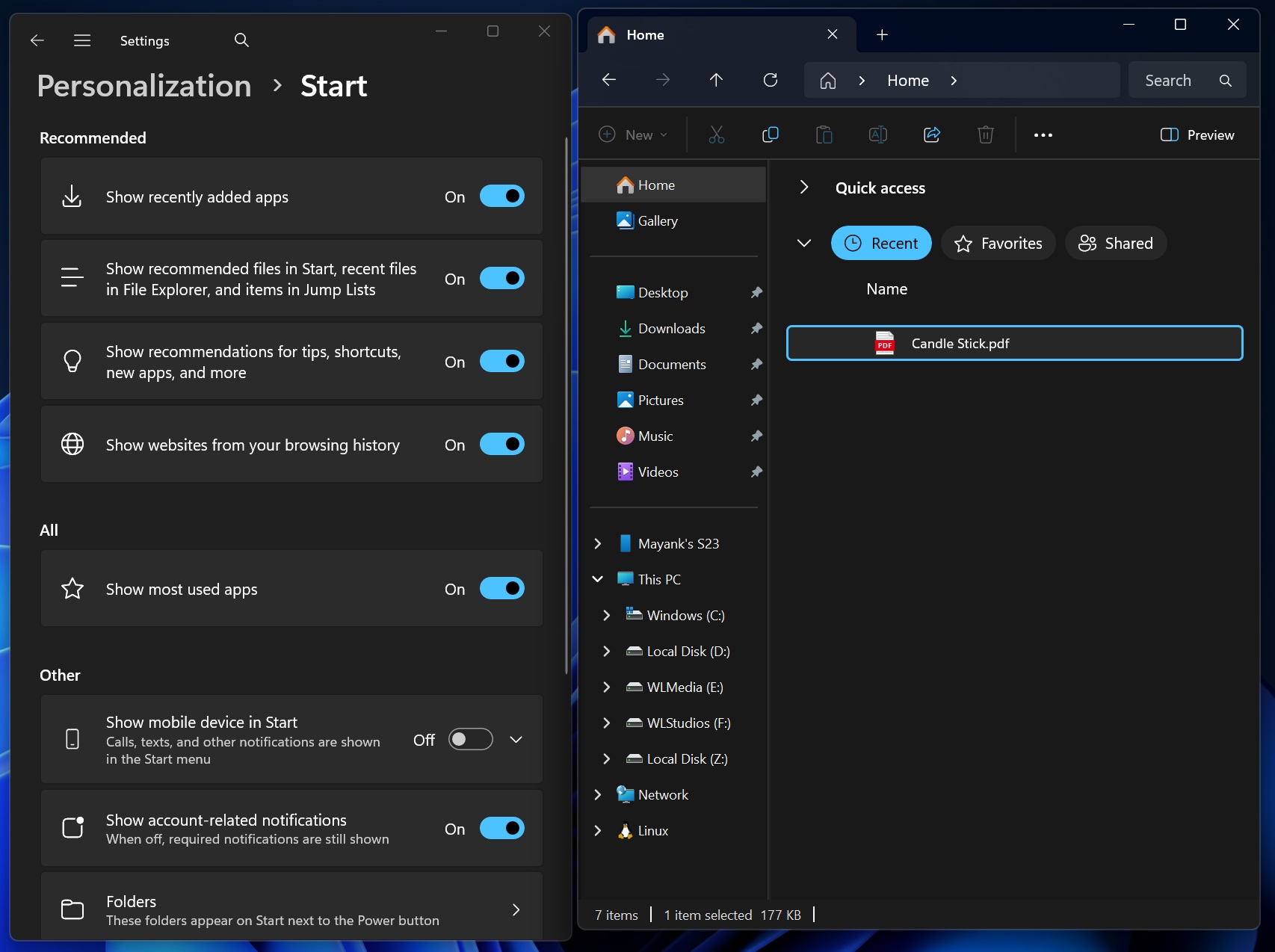
Now, when you turn off the new “Show recommended files in Start, recent files in File Explorer, and items in Jump Lists” toggle, you’re disabling the recent activity list.
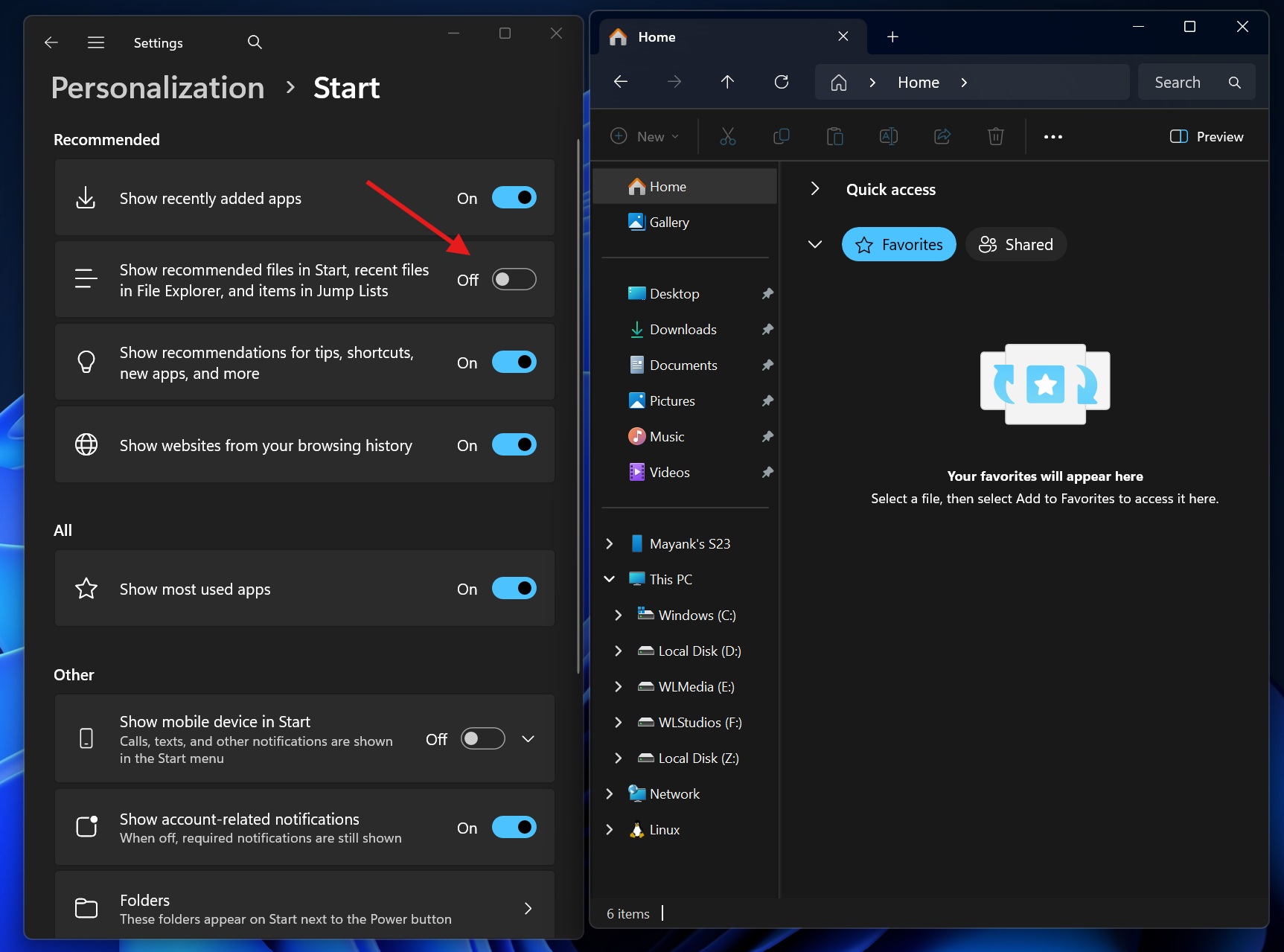
When Windows does not build the list or access to the list is disabled, every app or feature that depends on it won’t see the recent activity.
If Microsoft had wanted, it could have added a toggle to remove the Recommended section from the Start menu. Or Microsoft could have created a filter that allows Recent files to work in File Explorer. For example, the Start menu’s Recommended feed has recent apps too, but you don’t see apps appearing under ‘Recent’ in File Explorer.
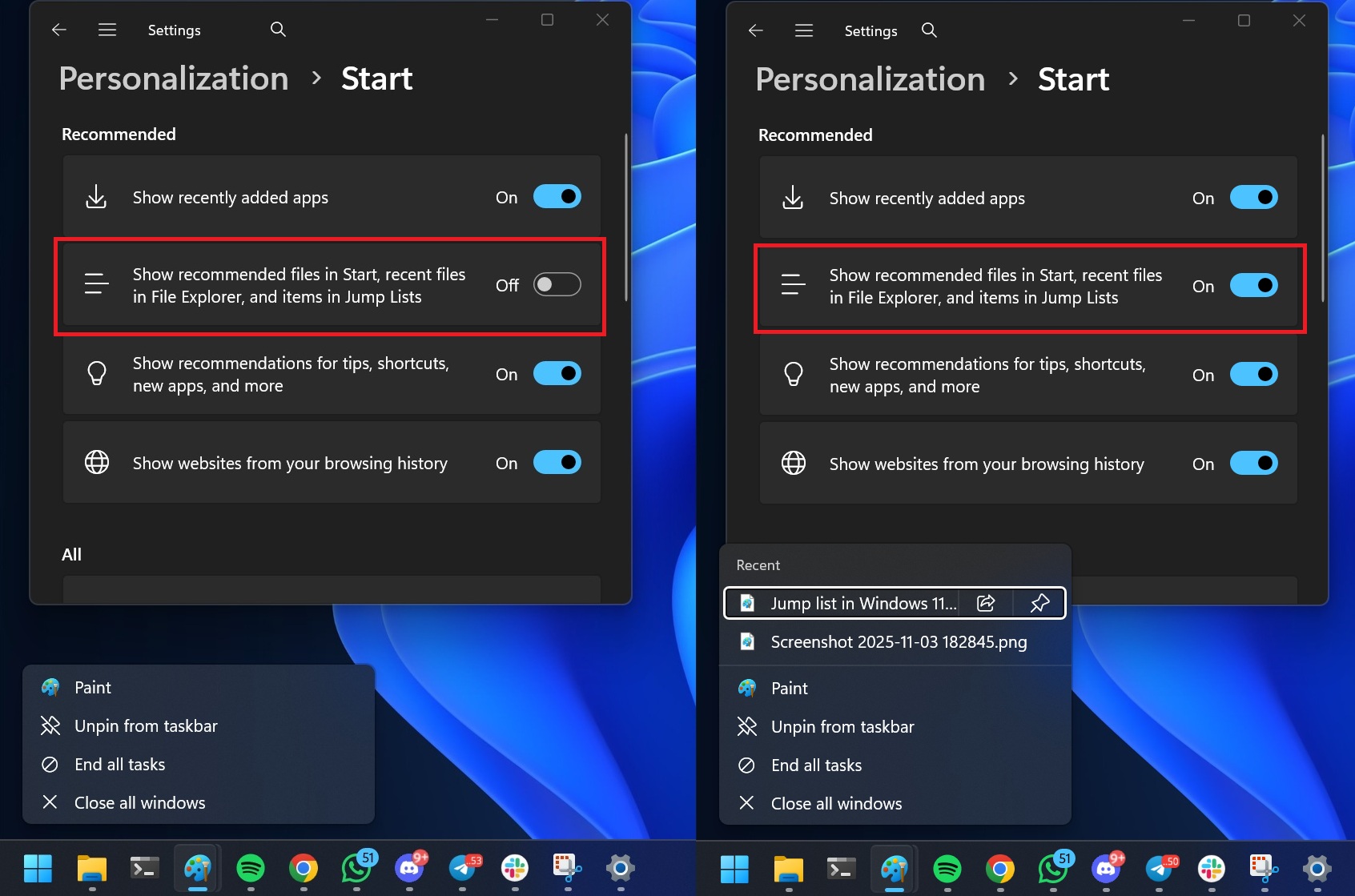
For now, you can’t hide Recommended only in Start while keeping Recents in Explorer or the jump list.
The new Start menu is tall, so Microsoft will also make the Search panel taller
As much as I like the new Start menu, I dislike how tall it is. It almost covers two-thirds of my 14-inch screen unless I manually change the scaling setting to 150% from 175%. But that also makes everything else smaller.
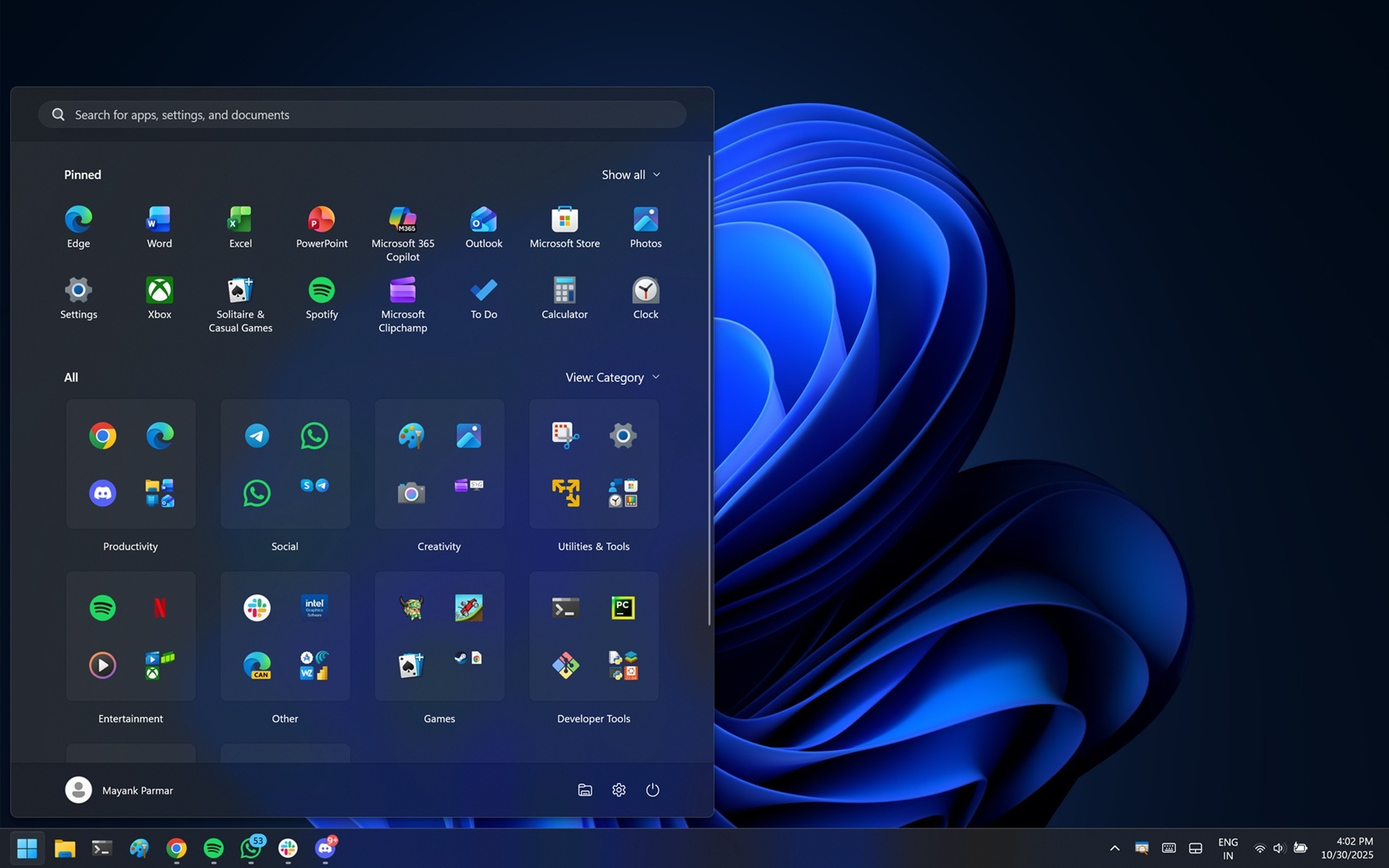
Microsoft says that the new Start menu is adaptive, so when it feels it has enough screen space, it’ll show more apps, and the number of grids will increase. All of that makes the new Start menu larger, even if you remove the Recommended feed.
Now, the issue is with the Search UI, which is still smaller than the new Start menu, and the transition feels odd.
Microsoft confirmed it’s experimenting with a larger Search UI that complements the new Start menu on Windows 11.
I do wish Microsoft allowed us to manually resize the Start menu, just like how we could in Windows 10. What is your Start menu wish list?
The post Windows 11 Start menu’s hide Recommended toggle also disables Recent files in File Explorer appeared first on Windows Latest
At JetBrains, we’ve always believed in giving developers the best possible tools to enhance productivity and creativity. Recently, you’ve shared important feedback about AI usage limits, transparency, and the freedom to choose which AI providers you use. We heard you loud and clear.
That’s why we are working to introduce bring-your-own-key (BYOK) support for JetBrains AI Assistant and Junie. Simply put, BYOK will allow you to connect your personal accounts from OpenAI (or any compatible API) and Anthropic so you can use them directly in your JetBrains IDE. This feature will later be extended to work with Google Gemini, Azure, AWS Bedrock, and even self-hosted local models, and you will even be able to use it without a JetBrains AI subscription.
Why BYOK?
We understand that quotas can feel restrictive, and unclear usage policies can lead to frustration. With the BYOK feature, you will no longer be limited to JetBrains-managed quotas. Instead, you will use your own existing AI provider accounts, gaining clear visibility into your usage and costs directly from your provider.
What will this mean for you?
- Freedom of choice: Pick your preferred AI model or provider. Whether it’s the latest cutting-edge model from Anthropic or Google, or a cost-efficient local model hosted on your own servers, you will decide what best suits your workflow.
- Full transparency: Clearly see how much each AI interaction costs in real time on your selected platform, without worrying about hidden quotas or unexpected interruptions.
- Privacy and security: Your API keys will remain securely stored and managed on your own machine and will never be shared with JetBrains. Your data will stay between you and your chosen AI provider.
Building an open ecosystem
With planned support for industry standards like the OpenAI API, ACP (Agent Client Protocol), Agent2Agent (A2A) Protocol, and other common interfaces, JetBrains is committed to creating an open ecosystem. This approach means your IDE will become a hub that’s open to all current – and future – AI providers, without forcing vendor lock-in.
What’s next?
We expect to add this feature by the end of the year, and this is just the beginning of our journey. We’re currently also working on expanding the range of supported AI providers, simplifying configurations, and refining features based on your feedback.
We’d love to hear your thoughts and learn which features you’d like us to prioritize next. After all, we’re building the JetBrains AI ecosystem together.
As Abu Dhabi and Dubai kick off a significant week hosting annual energy and technology conferences, we want to share details of our ongoing and planned investments in the United Arab Emirates. Roughly two and a half years ago, we embarked on a new AI initiative with the encouragement and support of both the United States and UAE governments. Much of this progress has involved a new partnership with G42, the UAE’s sovereign AI company, with whom we’re making critical progress.
All told, Microsoft will invest $15.2 billion USD in the UAE between the start of this initiative in 2023 and the end of this decade, in 2029. This is not money raised in the UAE. It’s money we’re spending in the UAE. And as we do everywhere in the world, we’re focused not just on growing our business but also on contributing to the local economy. This involves bringing together three critical factors – technology, talent, and trust.
On some days, it feels like the tech sector is gripped in a rhetorical race to announce ever larger, sky-high numbers. We believe in moving fast while staying grounded and being transparent about our investment details. And we want to share our strong conviction that our investments benefit the shareholders of our company, the people of the UAE, and the relationship between our two nations.
Our Investment Numbers
Our $15.2 billion USD investment includes the following:
- Beginning in 2023 and through the end of this calendar year, Microsoft will have invested and spent just over $7.3 billion in the UAE. This includes our $1.5 billion equity investment in G42, more than $4.6 billion in capital expenses in advanced AI and cloud datacenters in the country, and more than $1.2 billion in local operating expenses and the cost of goods sold.
- From the start of 2026 to the end of 2029, we will spend more than $7.9 billion in the UAE. This includes more than $5.5 billion in capital expenses for ongoing and planned expansion of our AI and cloud infrastructure, including new steps we will share publicly in Abu Dhabi this week. It also includes almost $2.4 billion in planned local operating expenses and the cost of goods sold.
An Investment in World-Leading Technology
Some of our most important work involves exporting world-leading technology from the United States to the UAE. This includes the GPUs essential to power AI in our datacenters across the country that support the UAE’s people and institutions.
Microsoft was one of the few companies during the previous administration to secure export licenses from the Commerce Department to ship GPUs to the UAE. In no small measure, this is because of the substantial work we did to meet the strong cybersecurity, national security, and other technology conditions required by these licenses. These licenses enabled us to accumulate in the country the equivalent of 21,500 Nvidia A100 GPUs, based on a combination of A100, H100, and H200 chips.
Microsoft was also the first company this year under the Trump administration to secure export licenses from the Commerce Department to ship GPUs to the UAE. Approved in September, these were based on updated and stringent technology safeguards. These licenses enable us to ship the equivalent of 60,400 additional A100 chips, in this instance involving Nvidia’s even more advanced GB300 GPUs.
While the chips are powerful and the numbers are large, more important is their positive impact across the UAE. We’re using these GPUs to provide access to advanced AI models from OpenAI, Anthropic, open-source providers, and Microsoft itself. We’re supporting AI-enabled applications, including our Copilot applications, from a wide variety of local and international providers. And we’re partnering with G42 to support public and private sector organizations across the UAE economy, as well as consumers across the country.
The UAE’s ranking in the Microsoft AI Diffusion Report published last week shows the country leading the world in per capita AI usage. With 59.4 percent of the population using generative AI, the UAE is ahead of Singapore, which is in second place at 58.6 percent. Beyond these two, no other country tops the 50 percent mark. Microsoft’s infrastructure challenge in the UAE is not a risk of getting ahead of demand but keeping pace with it.
Investing in Talent
Microsoft’s investment in the UAE is not just about technology, it’s also about people. By cultivating AI talent and skilling individuals to develop, deploy, and use AI in a way that reflects the region’s unique needs, Microsoft is helping to ensure that the UAE remains on the leading edge of AI diffusion.
Today, Microsoft’s presence in the UAE reflects this commitment. Our growing team includes almost 1,000 full-time employees and related staff representing 40 nationalities. Nearly 100 of our employees are engineers, supported by an Emirati partner ecosystem that has grown almost threefold in just two years, now with 1,400 firms employing nearly 45,000 professionals across the country.
This year, we established the Global Engineering Development Center in Abu Dhabi to attract world-class tech talent to the UAE. Our engineers not only develop new products and services for Microsoft, but support institutions and businesses across the region so they can use AI and cloud technologies to transform their own operations. As we look to the future, we aspire to grow our engineering teams further and add a new focus on domain-specific AI models and applications that will propel advances in key scientific and technological fields.
We also opened a new center for the Microsoft AI for Good Lab in Abu Dhabi, staffed by PhD level research talent specializing in large-scale AI models, vision-language models, and post training techniques. Backed by Azure compute grants allocated to partner organizations, this team collaborates with nonprofits, start-ups, researchers, academic institutions, and local businesses to address humanitarian challenges across the Middle East and Africa using AI. Already, the Lab has partnered with researchers to train large language models for low-resource languages, including those spoken in Malawi, Tanzania, Kenya, Uganda, and the Democratic Republic of the Congo – helping ensure that AI serves communities that risk being left behind in the AI age.
As the Microsoft AI Diffusion Report underscores, people need digital proficiency to fully participate in an AI-driven economy. Without the right skills, AI risks deepening inequality rather than broadening opportunity. That’s why skilling is a core pillar of our investment in the UAE.
Last November, we committed to skill one million people in the UAE by the end of 2027–and we’re well on our way to meet – and exceed–our goal. Last month at GITEX, Microsoft partnered with UAE government entities to launch an initiative to upskill 120,000 government employees across the federal government, Abu Dhabi, Dubai, and Sharjah. We will also skill 175,000 students and 39,000 teachers through collaborations with GEMS, Abu Dhabi Department of Education (ADEK), and the Knowledge and Human Development Authority (KHDA). We will announce new steps in this area on Thursday in Dubai.
Talent is the engine of AI leadership. Attracting, nurturing, and building AI talent and know-how is essential to the UAE turning its vision of becoming a global leader into a reality.
Strengthening Trust
Ultimately, the use of AI depends on trust. People and institutions need to trust that AI will be developed and deployed with responsible safeguards. They need to have confidence that the cybersecurity of AI chips, models, and services will be protected. And they rightly expect AI to serve the public broadly, with cause for optimism that AI will reach and support the Global South.
Given the role of export controls and other trade issues, the flow of advanced GPUs and AI models also requires trust between nations. This in turn requires clear rules and agreements, coupled with effective compliance systems. And as always, trust between nations depends on strong relationships between its people, grounded in mutual respect and appreciation for each other’s cultures.
We’re focused on supporting all these needs.
One important part of this is the Responsible AI Future Foundation, or RAIFF. G42, Microsoft, and Mohamed bin Zayed University of Artificial Intelligence (MBZUAI) founded this new foundation in Abu Dhabi in February to promote responsible AI standards and best practices in the Middle East and across the Global South. This foundation is advancing research on the technical and ethical elements of responsible AI and is developing frameworks to ensure ethical development and deployment of AI systems, accounting for cultural diversity.
A second element comes to life through the first annual Abu Dhabi Global AI Summit, which began Sunday. Hosted by G42, Microsoft, the Responsible AI Future Foundation, and Eurasia Group’s GZERO Media, this Summit brings government ministers, private sector executives, and AI leaders together to discuss what’s needed to drive AI diffusion across the Global South. We meet at a time when there is a growing risk that uneven AI diffusion may widen the economic and societal gaps that divide the world. It’s imperative that governments, businesses, and non-governmental organizations collaborate and take new steps to promote broader access to AI.
Both these elements build on a third and deeper initiative that Microsoft and G42 have advanced during the past two years. In conjunction with our $1.5 billion investment, Microsoft and G42 created last April a first–of–its–kind binding framework between two private companies. Developed in close consultation with the U.S. and UAE governments, this Intergovernmental Assurance Agreement (IGAA) ensures that both our companies meet or exceed U.S. standards in critical areas such as cybersecurity and physical security, export controls and technology transfer, data protection and responsible AI, and Know Your Customer (KYC) best practices.
As we drafted the IGAA, we consulted not only leaders from government ministries in our two countries, but with members and staff of both political parties in both houses of Congress in Washington, D.C. We listened to feedback and adapted the IGAA to address their suggestions. And we’ve built a strong compliance infrastructure to implement these requirements based on industry best practices and auditing standards.
All these steps help bolster mutual confidence and trust between our two governments. But trust between nations also grows through relationships among people. That’s why we’re advancing a fourth and new element this week, traveling to Abu Dhabi with a Seattle delegation of public and private leaders. The group includes a former Governor and local leaders in economic development, higher education, medical research, the non-profit community, and sports. The goal is to deepen understanding, exchange ideas, and explore solutions that can advance both regions.
Looking to the Future
Microsoft is committed to the future of the UAE and a strong relationship between our two nations. We believe in the UAE’s long-term economic vision and the role the UAE and the U.S. continue to play together to support peace, stability, and growth across the Middle East.
As we do everywhere we do business, Microsoft is committed to a broad perspective and long-term approach. Our work in the UAE has underscored the importance of connecting technology investments to initiatives to attract and develop the talent needed for a vibrant and self-sustaining tech ecosystem. And work to advance trust, which may seem peripheral to some, is in fact of central importance. From stronger business practices to broader international ties, trust is a critical catalyst for technology success at a local and global level.
Technology is our business and we’re as excited as anyone by its potential. But we know that ultimately there is only one test that matters. It’s how our technology empowers others to achieve more. Like every public company, our shareholders rightly expect us to deliver value to customers in ways that enable us to continue to grow. But we also judge ourselves by whether we are generating local opportunities and growth that go well beyond ourselves. Across the UAE, we’re committed to passing this test.
The post Microsoft’s $15.2 Billion USD Investment in the UAE appeared first on Microsoft On the Issues.